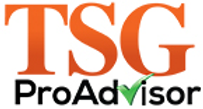Students are now working with real software, using smart tools that help catch errors, and earning credentials without setting foot in a lecture hall. Technology is helping people build skills faster, on their own schedule, and with fewer barriers.
From college students in Florida to licensed CPAs updating their knowledge, tech is reshaping what it means to be prepared in this field. Online certifications, AI-powered audit tools, and mobile-friendly courses are now part of everyday learning.
In the sections ahead, we will look at how online classes, hands-on software training, bite-sized lessons, artificial intelligence, and flexible continuing education are making tax and accounting more practical and accessible for students and professionals across Florida.
1) Online Education Is Changing How Future Accountants Learn
Learning tax and accounting no longer depends on sitting in a classroom during business hours. With the rise of online education, students can now attend lectures, complete assignments, and even take exams from anywhere with a stable internet connection. Whether it’s an undergraduate program, a certification course, or continuing education for licensed professionals, virtual learning has opened the door for more people to move forward in the field on their own terms.
Florida has recognized this shift. The Florida Board of Accountancy allows Certified Public Accountants (CPAs) to earn Continuing Professional Education (CPE) credits through online courses, webinars, and self-study, as outlined in Florida Administrative Code 61H1-33.003. This means CPAs can meet their licensing requirements without having to attend in-person sessions.
60% of Client Advisory Services (CAS) staff work remotely or in hybrid roles, spending more than two days a week outside the office.
Source: CPA.com & AICPA PCPS CAS Benchmark Survey
With the profession already adapting to flexible work environments, it makes sense that accounting education is doing the same. Online learning is now part of how the industry prepares for the future.
2) Tax and Accounting Students Are Training on Real Software
 Today’s tax and accounting students aren’t just learning theory, they’re gaining hands-on experience with the exact tools professionals use every day. Software like QuickBooks, Xero, and ProSeries have become essential parts of accounting work, and training on these platforms helps students build practical skills that employers want.
Today’s tax and accounting students aren’t just learning theory, they’re gaining hands-on experience with the exact tools professionals use every day. Software like QuickBooks, Xero, and ProSeries have become essential parts of accounting work, and training on these platforms helps students build practical skills that employers want.
Many Florida schools, including the University of Florida (UF) and Florida State University (FSU), have recognized this shift. They now offer QuickBooks Online certification programs, so students graduate ready to jump right into the workforce with a solid understanding of widely used cloud accounting software.
85% of small businesses use cloud-based accounting software. Source: Forbes
Using real-world tools in the classroom boosts confidence when students start their careers. This practical approach helps future accountants hit the ground running.
3) Bite-Sized Lessons Make Tax and Accounting Easier to Learn
Tax codes and accounting rules can be a lot to take in. That’s why more learners are turning to microlearning, which is short, focused lessons that cover one topic at a time. These bite-sized sessions help break down tough material into manageable parts, making it easier to remember and less stressful to study.
Platforms like Coursera, Udemy, and LinkedIn Learning offer flexible options where learners can watch a 10-minute video on a specific tax rule or accounting principle, pause when needed, and pick up again without losing track. This format works well for busy students, professionals, and anyone trying to build skills between other responsibilities.
Learners retain 80% more through interactive digital content. Source: Journal of Accounting Education
By keeping lessons short and interactive, students stay more engaged and actually absorb the material.
4) How Artificial Intelligence Is Helping Accounting Students
 Artificial Intelligence (AI) is becoming an invaluable tool for accounting students, offering real-time assistance in identifying errors and understanding complex financial data. Instead of manually sifting through spreadsheets, students can now leverage AI to analyze entire datasets, uncover anomalies, and gain insights that were previously time-consuming to obtain.
Artificial Intelligence (AI) is becoming an invaluable tool for accounting students, offering real-time assistance in identifying errors and understanding complex financial data. Instead of manually sifting through spreadsheets, students can now leverage AI to analyze entire datasets, uncover anomalies, and gain insights that were previously time-consuming to obtain.
One notable AI tool making waves in accounting education is MindBridge AI. Through its University Alliance Program, MindBridge provides students and instructors with free access to its platform, enabling hands-on experience with cutting-edge audit technology.
This initiative has already benefited over 12,000 students since its launch in 2017, offering practical case studies and assignments that simulate real-world auditing scenarios.
AI-based audit tools can cut error rates by 25%. Source: CPA Practice Advisor
By integrating AI tools like MindBridge into their curriculum, accounting programs are equipping students with the skills needed to navigate the evolving landscape of financial auditing. These technologies enhance learning outcomes and prepare students for the increasing reliance on AI in the accounting profession.
5) Flexible Learning Options for Tax and Accounting Students
Balancing education with work and family responsibilities can be challenging, especially for those pursuing careers in tax and accounting. Recognizing this, educational institutions have increasingly adopted flexible learning options to accommodate diverse student needs. These options include night and weekend classes, as well as mobile-accessible coursework, enabling learners to study at times and locations that suit their schedules.
In Florida, the Board of Accountancy supports this flexibility by allowing Certified Public Accountants (CPAs) to fulfill their Continuing Professional Education (CPE) requirements through various formats, including online courses. According to Rule 61H1-33.003 of the Florida Administrative Code, CPAs can earn CPE credits via self-study programs, group programs, and technical meetings, provided they meet specific criteria.
In fall 2021, approximately 9.4 million undergraduate students, or 61% of all undergraduates, were enrolled in at least one distance education course.
Source: National Center for Education Statistics (NCES), U.S. Department of Education
For tax and accounting students, such flexibility facilitates the balancing of personal and professional commitments and ensures continuous compliance with licensure requirements.
6) Virtual Group Projects in Accounting Education
 Collaboration is a key skill in the accounting profession. With the rise of remote work, students are now gaining valuable teamwork experience through virtual group projects. Utilizing tools like Zoom for meetings and Google Docs for shared documents, students can work together effectively, regardless of their physical locations.
Collaboration is a key skill in the accounting profession. With the rise of remote work, students are now gaining valuable teamwork experience through virtual group projects. Utilizing tools like Zoom for meetings and Google Docs for shared documents, students can work together effectively, regardless of their physical locations.
This approach mirrors the modern workplace, where accounting teams often collaborate across different offices or even countries. By engaging in virtual group projects, students develop communication and coordination skills that are essential in today’s globalized business environment.
Remote collaboration boosts completion rates by 30% in online accounting programs. Source: Inside Higher Ed
Embracing virtual collaboration enhances learning outcomes and prepares students for the realities of the accounting industry, where remote teamwork is becoming increasingly common.
7) Online Continuing Education for Florida CPAs
Continuing Professional Education (CPE) is essential for Certified Public Accountants (CPAs) to maintain their licenses and stay current with industry standards. In Florida, CPAs are required to complete 80 hours of CPE every two years, including specific hours in accounting, auditing, and ethics.
To accommodate diverse schedules and learning preferences, many organizations offer flexible, online CPE options. For instance, the Florida Institute of CPAs (FICPA) provides a range of online learning opportunities, including live-streaming seminars, webcasts, and on-demand courses. These options allow professionals to earn CPE credits without the need to attend in-person sessions.
Nationally, the American Institute of Certified Public Accountants (AICPA) and the National Association of State Boards of Accountancy (NASBA) have approved revisions to the Statement on Standards for Continuing Professional Education (CPE) Programs, effective January 1, 2024. These revisions include additional options for virtual learning, providing more flexibility for CPAs to meet their CPE requirements.
89% of CPAs use digital platforms for continuing education. Source: National Association of State Boards of Accountancy (NASBA)
Embracing online CPE options helps CPAs stay compliant with licensing requirements and allows them to tailor their learning experiences to fit their individual needs and schedules.
8) The Future of Tax and Accounting Education in Florida
Tax and accounting education in Florida is evolving to match the fast pace of technology and the steady stream of updates from the IRS and state law. As new tools emerge and rules shift, education providers are working to make sure that students and professionals stay informed, prepared, and relevant.
Schools across Florida are adapting by offering coursework that reflects real-world systems. Programs now teach students how to work independently, use modern accounting platforms, and handle remote workflows that have become common across firms. This matters because today’s roles in tax and accounting often demand digital fluency just as much as technical accuracy.
CPAs in Florida must complete 80 hours of continuing professional education every two years.
Source: Florida Statutes, Chapter 473.312
To keep education meaningful and forward-looking, both academic institutions and firms are encouraged to keep investing in the technology that supports student growth. When tools reflect the systems professionals actually use, students walk away more capable and confident in their work.
Ready to Lead the Future of Tax and Accounting? Start Your Journey with TSG Pro Advisor
If you’re looking to build the skills and knowledge needed to succeed in today’s tax and accounting world, TSG Pro Advisor is here to help. With the latest tools, expert guidance, and flexible learning options, you can prepare yourself for a career that keeps pace with technology and industry changes.
Contact us to learn more and find the right program for you. Your future in accounting is just a conversation away.


